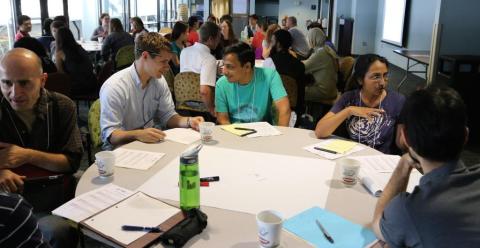INSPIRE2 will equip graduate students with tips, techniques and methods to try in their classrooms to better engage students.
Georgia Tech has become a living laboratory for testing new methods and models for classroom education, and that pioneering spirit is even trickling down to graduate students.
This week, the Georgia Tech student chapter of the American Society for Engineering Education (GT-ASEE) will host INSPIRE2, its second annual workshop designed to equip graduate students with new tools and techniques to engage students in the classroom.
“We realize we’re talking to graduate students who aren’t yet in a position to design revolutionary classrooms, so we’re focusing on small changes you can apply yourself in class,” said Scottie-Beth Fleming, a doctoral student in aerospace engineering and former president of GT-ASEE.
What began as a one-day event last year has doubled to two this year. Day one will feature Michael Prince, a professor of chemical engineering at Bucknell University who professes to be “interested in almost any question that has to do with how engineering students learn” and whose research focuses on enhancing classroom experiences.
Day two will include presentations from an array of Tech faculty who are piloting new teaching methods in their classrooms or have expertise in learning sciences. Presenters include Bonnie Ferri, Joe LeDoux, Wendy Newstetter, Caroline Noyes, Amy Pritchett, Dia Sekayi, Don Webster and Damon Williams.
A panel of graduate students, all of whom have completed the Center for the Enhancement of Teaching and Learning’s (CETL) Tech to Teaching program, will talk with their peers about their experiences as instructors of college courses.
All presenters will discuss active learning, focusing on student-centered classroom organization.
As a national organization, ASEE takes learning research and applies it to the classroom. GT-ASEE was founded in 2011 by graduate students and aims to create a community of students interested in enhancing classroom experiences through teaching and scholarship. Newstetter also serves as the organization’s advisor.
“I didn’t recognize the importance of the intricacies involved in effective classroom design when I first started my Ph.D. program,” Fleming said. “Learning about the scholarship of teaching and learning got me involved with and excited about the future of engineering education. I now hope to incorporate contributions to engineering education in my end thesis.”
The workshop is free to attend, thanks to support from Graduate Education and Faculty Affairs, the Student Government Association, CETL, Georgia Tech Student Foundation, and Campus Services Buzzfunds. Nearly 100 are expected to attend this year.
